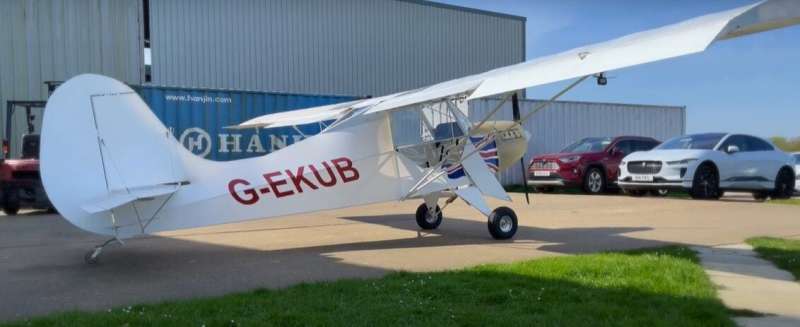First all-British electric aircraft makes successful test flights

A project managed by Cranfield University to advance electric aviation has achieved a significant milestone, with what is thought to be the first ever flight by a British designed and built, all-electric conventional airplane.
After taxi tests and “low hops,” the single seat Sherwood eKub made its first flight of 10 minutes and then a second flight later in the day of 22 minutes from Little Snoring airfield in Norfolk.
Huge step forward for electric aviation
The flights were piloted by Dr. Guy Gratton, Associate Professor of Aviation and the Environment at Cranfield University and an Associate Fellow of the Society of Experimental Test Pilots, who is also program manager for the Enabling Aircraft Electrification (EnabEl) project.
Dr. Gratton said: “The airplane flew very much as predicted from our analysis and ground tests; this is a new way of flying, and we’re at the start of a steep learning curve on electric flight. The support from everybody on the team, as well as colleagues, funders and authorities has been fantastic in making this possible. As a test pilot, an aeronautical engineer, and as a researcher, learning all about this new class of airplane is one of the most exciting things I’ve ever done.”
Paul Hendry Smith, Managing Director of The Light Aircraft Company (TLAC), which built the eKub and from whose Little Snoring site the airplane was test flown, said: “This is clearly a milestone in electrically powered flight and we are delighted to be at the cutting edge.”
Delivering safe and environmentally efficient aircraft
The eKub is a British designed and built all-electric microlight airplane and has been developed by a consortium of Cranfield University, TLAC, Flylight Airsports and CDO².
Funded by consortium partners and UK Research and Innovation (UKRI) as part of the Future Flight Challenge (FFC) initiative, the eKub is part of the broader EnabEl project focused on delivering safe, viable, and environmentally efficient airplanes.
Dr. Thomas Delaney, project electrical engineer and Cranfield Research Fellow, said: “One of the key outcomes of the project so far is the work that has been undertaken in the background to facilitate the development and operation of all-electric aircraft. The eKub has been developed as a learning platform so that the project outcomes can now directly advise microlight builders and aviation regulators on both design best practice and new certification standards for the new era of electrified flight.”
EnabEl is building two all-electric airplanes and the eKub flights will be followed by testing of a larger two-seat electric Skyranger Nynja Aircraft being built at Flylight Airsports’ base of Sywell Aerodrome in Northamptonshire.
NASA to begin high-voltage ground testing on all-electric X-57
Citation:
First all-British electric aircraft makes successful test flights (2022, April 29)
retrieved 29 April 2022
from https://techxplore.com/news/2022-04-all-british-electric-aircraft-successful-flights.html
This document is subject to copyright. Apart from any fair dealing for the purpose of private study or research, no
part may be reproduced without the written permission. The content is provided for information purposes only.
For all the latest Technology News Click Here
For the latest news and updates, follow us on Google News.
